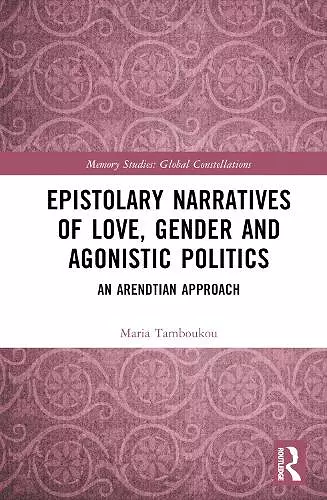Epistolary Narratives of Love, Gender and Agonistic Politics
An Arendtian Approach
Format:Hardback
Publisher:Taylor & Francis Ltd
Published:14th Jul '23
Currently unavailable, and unfortunately no date known when it will be back

This book revolves around epistolary narratives of women political theorists and activists, following traces of Hannah Arendt’s philosophical approaches to love and agonistic politics. Arend’s interlocutors are four revolutionary women in the long durée of the nineteenth and twentieth centuries in Europe and the USA: the romantic socialist Désirée Véret-Gay, the Marxist Rosa Luxemburg, the anarchist Emma Goldman and the labour activist Rose Pesotta. The book’s central argument is that Arendt’s philosophical thought can throw light on dangerous liaisons between love, gender and agonistic politics, further making connections with feminist ruminations around love as an existential force in the ephemeral constitution of the female self in modernity. Drawing on extended research with physical, digital and published archival collections, the book responds to the challenges of ‘the digital turn’ and highlights the importance of memory work, as a way of understanding the lasting effects of the past on the present. As such, Epistolary Narratives of Love, Gender and Agonistic Politics will appeal to scholars of sociology and gender studies with interests in research methods—particularly archival methods—the work of Arendt, feminist thought and memory studies.
"For those who have been reading Maria Tamboukou’s books work over the years, this book is a denouement of sorts. For those not yet familiar with the pleasures of reading Tamboukou, a distinctive pleasure awaits. Everything comes together via Tambakou’s ‘epistolary poethics’, which put an Arendtian agonism of love into conversation with the private and political writings of four revolutionary women: Désirée Véret-Gay, Rosa Luxemburg, Emma Goldman and Rose Pesotta. Agonism is also in the archive, with Tamboukou’s focus on women whose love letters code private and public. And readers are in the archive with Tamboukou, searching for the shards of revolutionary women’s writing, dispersed into the archives of men made more famous, or reading Emma Goldman’s papers, aware of their pending move under precarious conditions from the reduced shelter of a neo-liberalizing university to a community center. The pain of loss, thrill of discovery, and responsibility of care are braided together as Tamboukou wondrously guides her readers through the epistolarium, its history, and its politics. A must-read for scholars or fans of women's and labour history, feminism, anarchism, or Hannah Arendt."
- Bonnie Honig, Nancy Duke Lewis Professor, Brown University, USA
"The lives of four ‘revolutionary women’ read through Hannah Arendt’s thinking and writing about love: Tamboukou offers us a compelling theoretical narrative on the fascinating entanglements between love and politics. This book convincingly – and joyously - argues that love is a crucial epistemological tool for feminist theory and a vital force for feminist practice."
- Olivia Guaraldo, Professor in Political Philosophy and Director of the Hannah Arendt Center for Political Studies, University of Verona, Italy
"For those who have been reading Maria Tamboukou’s books work over the years, this book is a denouement of sorts. For those not yet familiar with the pleasures of reading Tamboukou, a distinctive pleasure awaits. Everything comes together via Tambakou’s ‘epistolary poethics’, which put an Arendtian agonism of love into conversation with the private and political writings of four revolutionary women: Désirée Véret-Gay, Rosa Luxemburg, Emma Goldman and Rose Pesotta. Agonism is also in the archive, with Tamboukou’s focus on women whose love letters code private and public. And readers are in the archive with Tamboukou, searching for the shards of revolutionary women’s writing, dispersed into the archives of men made more famous, or reading Emma Goldman’s papers, aware of their pending move under precarious conditions from the reduced shelter of a neo-liberalizing university to a community center. The pain of loss, thrill of discovery, and responsibility of care are braided together as Tamboukou wondrously guides her readers through the epistolarium, its history, and its politics. A must-read for scholars or fans of women's and labour history, feminism, anarchism, or Hannah Arendt."
- Bonnie Honig, Nancy Duke Lewis Professor, Brown University, USA
"The lives of four ‘revolutionary women’ read through Hannah Arendt’s thinking and writing about love: Tamboukou offers us a compelling theoretical narrative on the fascinating entanglements between love and politics. This book convincingly – and joyously - argues that love is a crucial epistemological tool for feminist theory and a vital force for feminist practice."
- Olivia Guaraldo, Professor in Political Philosophy and Director of the Hannah Arendt Center for Political Studies, University of Verona, Italy
"In an important contribution to feminist love studies, Tamboukou offers a highly original synthesis of materialist thought on private life. Beginning with a relational concept of the self and building upon the notion of love as a potential source of power for women, in her analysis of love letters by four notable feminist socialists, Tamboukou succeeds in ‘realigning’ emotional attachments, effectively closing the gap between the personal and the political."
-Femmes Auteurs Anglo-AMéricaines [FAAAM], Paris Nanterre University
ISBN: 9781032191638
Dimensions: unknown
Weight: 453g
182 pages